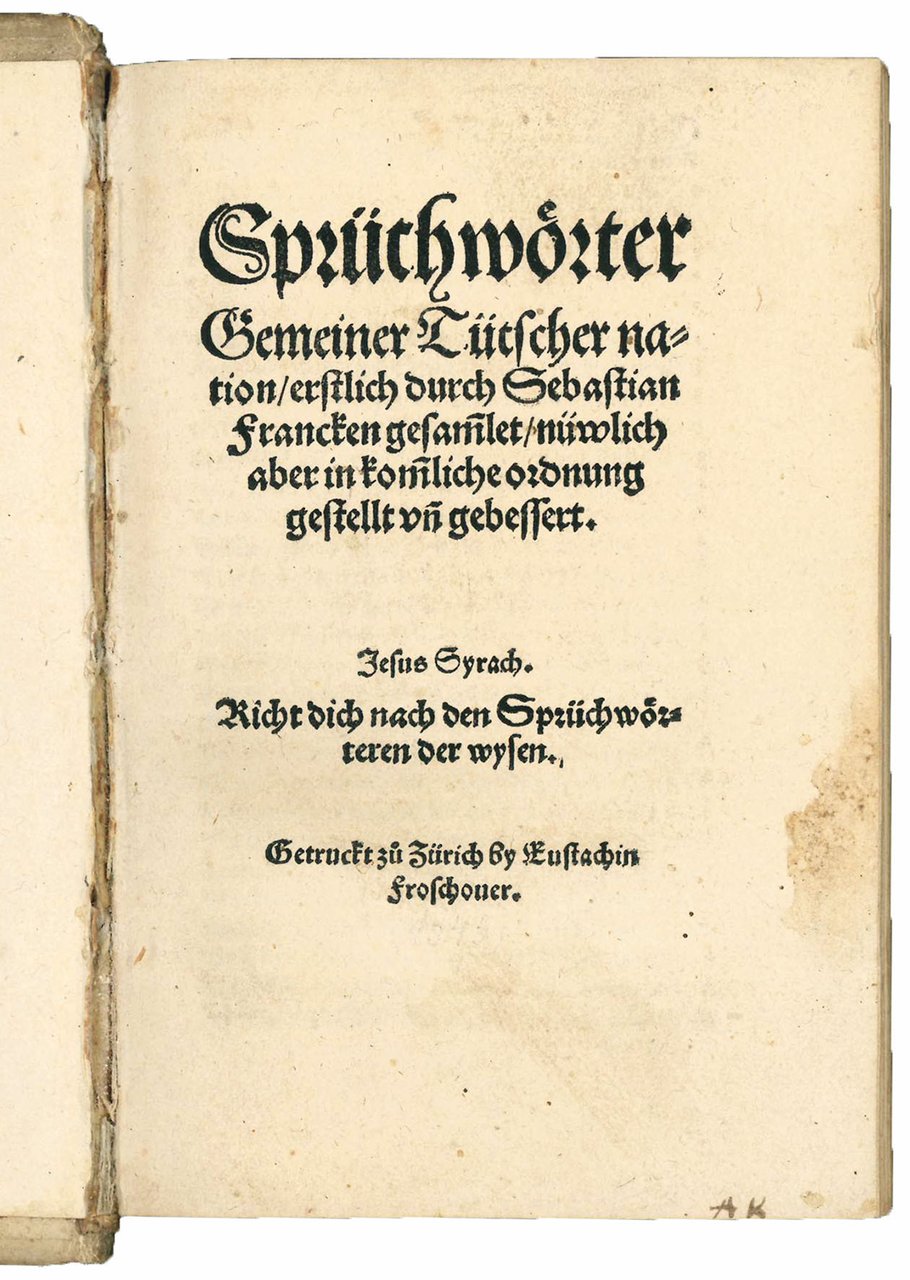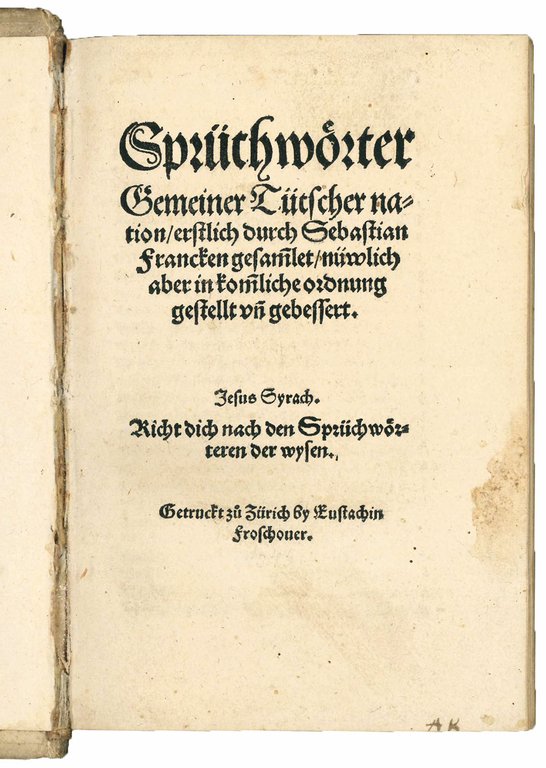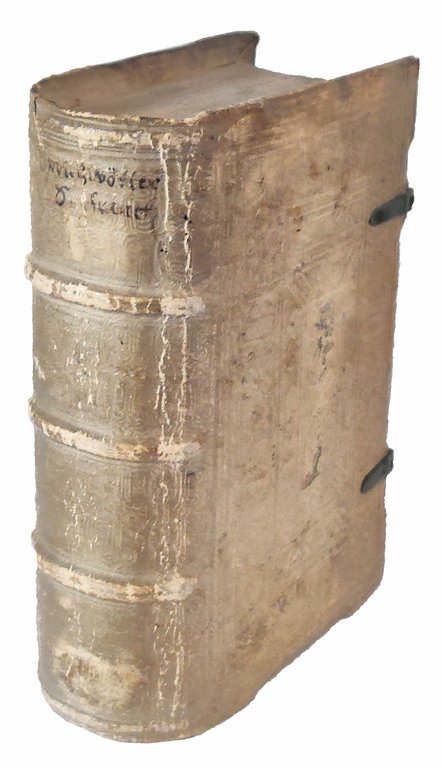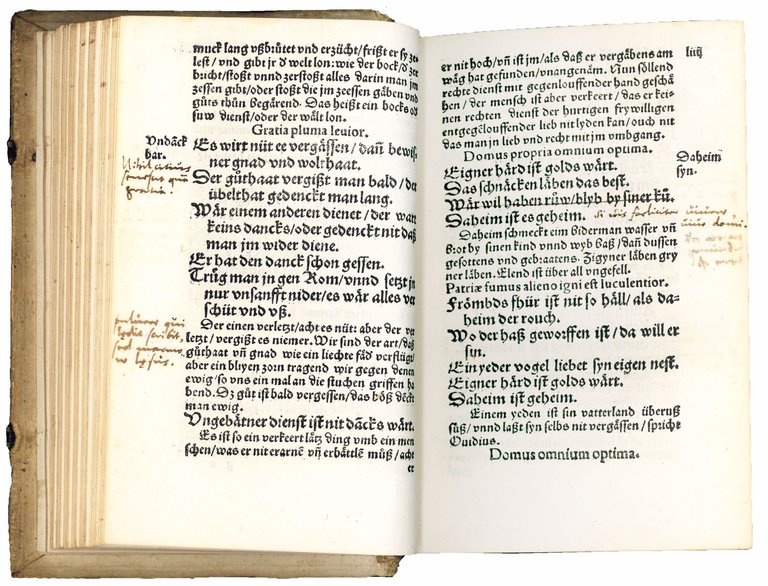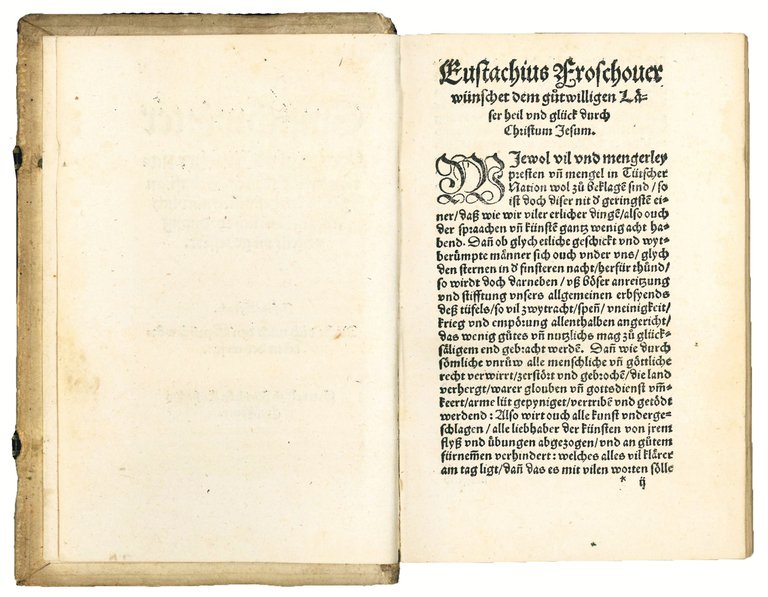Sprüchwörter Gemeiner Tütscher nation, erstlich durch Sebastian Francken gesammlet, nüwlich aber in kommliche ordnung gestellt und gebessert
Sprüchwörter Gemeiner Tütscher nation, erstlich durch Sebastian Francken gesammlet, nüwlich aber in kommliche ordnung gestellt und gebessert | Rare and modern books | FRANCK, Sebastian (1499-1542/43)
Sprüchwörter Gemeiner Tütscher nation, erstlich durch Sebastian Francken gesammlet, nüwlich aber in kommliche ordnung gestellt und gebessert
Sprüchwörter Gemeiner Tütscher nation, erstlich durch Sebastian Francken gesammlet, nüwlich aber in kommliche ordnung gestellt und gebessert | Rare and modern books | FRANCK, Sebastian (1499-1542/43)
Payment methods
- PayPal
- Credit card
- Bank transfer
- Pubblica amministrazione
- Carta del Docente
Details
- Year of publication
- [1545]
- Place of printing
- Zürich
- Author
- FRANCK, Sebastian (1499-1542/43)
- Publishers
- Eustachius Froschauer
- Keyword
- Quattro-Cinquecento
- State of preservation
- Good
- Languages
- Italian
- Binding
- Hardcover
- Condition
- Used
Description
“UN SUCCÈS IMMENSE” (GRATET-DUPLESSIS)
Two parts in one volume, 8vo (153x100 mm). [8], ccxlvii, [1 blank]; [4], cxcii leaves. Collation: *8 a-z8 A-H8; †4 aa-zz8 Aa8. Leaf H8 is a blank. Contemporary blind-tooled pigskin over wooden boards dated 1558 and signed with the initials “A.K.” (repeated in manuscript at the bottom of the title page), two clasps preserved (slightly soiled, spine rubbed). Stamp of “Menno P.W. de Limburg” on the front pastedown and flyleaf. A superb copy with some contemporary annotations and underlining in brown ink.
Second edition (the first was printed in Frankfurt by C. Egenolff in 1541) of this fundamental and incredibly successful collection of seven thousand proverbs, recast in Swiss German by the printer, newly arranged by subject by Konrad Pellikan (1478-1556) and provided with an index for each part. Some of the German proverbs are accompanied by Latin equivalents. This second edition is the only one, along with the first, to include Franck's name in the title; all subsequent editions omit him.
“Une édition publiée à Zurich, vers 1545, porte également au titre le nom de Seb. Franck, mais elle offre un travail particulier de l'éditeur, car les Proverbes y sont distribués par ordre alphabétique et s'y trouvent énoncés dans le dialecte allemand particulier à la Suisse […] J'ai déjà dit quelques mots de cette édition qui donne les Proverbes de Franck distribués par ordre alphabétique et exprimés dans le dialecte allemand usité en Suisse. Elle est fort rare, et présente, dans sa spécialité, un intérêt qui lui est propre” (P.-A. Gratet-Duplessis, Bibliographie parémiologique, Paris, 1847, pp. 326 and 328).
“Die folkloristisch bedeutende Sprichwörtersammlung Sebastian Francks, die erstmals 1541 bei Egenolf zu Frankfurt erschienen war, gab Froschauer 1545 in durch Konrad Pellikan ausgearbeiteter Neuordnung heraus (Rud. 318). Als Drucker und Verleger zeichnet Christophs Bruder Eustachius, der dem umfangreichen Oktavbande eine Vorrede vorausschickte” (P. Leemann-Van Elck, Die Offizin Froschauer, Zurich-Leipzig, 1940, p. 92).
The proverbs are taken from folklore, contemporary speech, classical languages and the dialects of north-western Europe. Fables and stories of common folk and powerful people complete the entries. Generations of writers have plundered the collection for ideas and phrases. In the Proverbs Franck conveys practical rules of life and wisdom for the common reader. At the same time, he places his theological program in a traditional cultural context by translating Jewish, ancient and national language collections of proverbs into German.
“Sebastian Franck (Eleutherius) was born at Donauwörth, in Swabia, studied in Ingolstadt and Heidelberg, and took holy orders in the diocese of Augsburg. In 1527 he served as a Lutheran pastor near Nürnberg, but one year later he joined the Anabaptist community in the imperial city. This association did not last long either, and in 1529 Franck moved to Strasbourg, where he tried to settle down as a writer and private scholar. He maintained personal contacts with such radical religious thinkers as Kaspar Schwenckfeld, Hans Denck, Johannes Bünderlin, Johannes Cam-panus, and perhaps also with Michael Servetus, who came to Strasbourg in 1531 to debate with Capito and Bucer. Denck and Bünderlin seem to have exerted a decisive influence upon Franck, who became more and more critical of all ecclesiastical institutions and adopted a fully spiritualist position. After having been expelled from Strasbourg in 1531 he spent some time at Esslingen, where he tried to make a living as a soap-boiler. In 1532 he moved to Ulm, where he set up a printing shop. His writings provoked the wrath of the Lutheran preachers, and on the initiative of Martin Frecht he was eventually banished again in 1539. After further wanderings he settled in Basel in 1541. He acquired citizenship and again started his printing business, but after little more than a year he died. Franck's literary a
